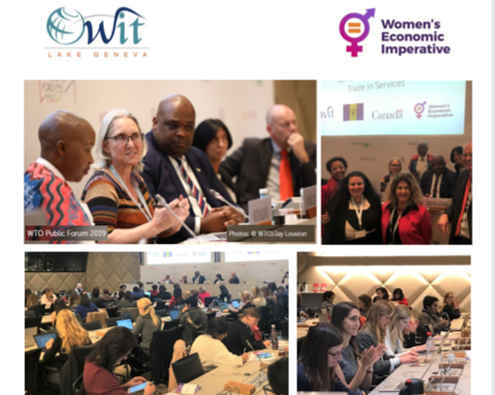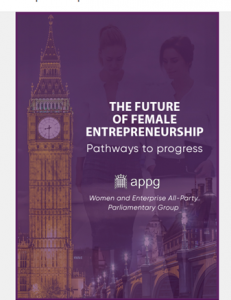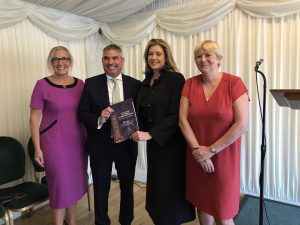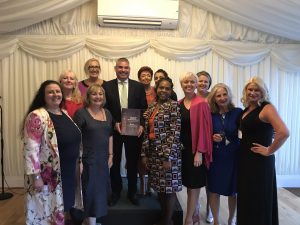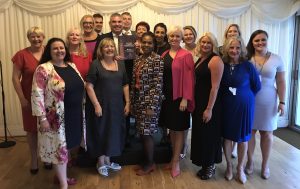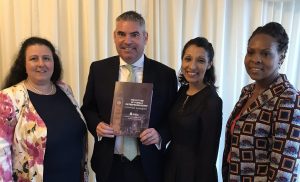Noreen Burroughes Cesareo, Principal, Market Accents and representing WEI, together with co-hosts OWIT, participated in the WTO Public Forum 2019 Gender Inclusiveness in Trade in Services held on October 9, 2019 in Geneva, Switzerland. Following is the report from the sessions.
WTOPF WEI-OWIT Report October 2019
WTO Public Forum 2019 Gender Inclusiveness in Trade in Services October 9, 2019, Room: S1, 16.30 – 18.00 Organization of Women in International Trade | OWIT Lake Geneva | OWIT Canada | OWIT Nairobi | Women’s Economic Imperative
Session Overview & Recommendations
Speakers
Ambassador Chad Blackman, Barbados Ambassador and Permanent Representative to the United Nations and Other International Organizations in Geneva • Ambassador Stephen de Boer, Canadian Ambassador & Permanent Representative to the WTO • Nino Zambakhidze, Chairwoman & Founder, Georgian Farmers Association • Yolanda Gibb, Global Lead, Trade, Women’s Economic Imperative (WEI)
Moderator: Mucha Mlingo, President OWIT Nairobi
Context:
Services add value to manufacturing and contribute to competitiveness, employment and trade. Technological innovations and ICT make “traditional“ services easier to deliver internationally. Intangible elements add value to traded products, leveraging AI, big data and technology. Advances in technology revolutionized existing and created new service sectors, and technology has led to new business models that represent game-changers in a range of industries.
Gender equity in Trade in Services is a multi-faceted and complex issue that needs to be addressed by a diverse and multidisciplinary group that understands different sectors and countries; combines theory and practice; and works at macro-, meso- and micro- level.
Following a dynamic discussion and engagement with representatives from NGOs, government representatives, private sector and development partners, we join together in thanking our panelists and the key contributions from Ambassador Blackman and Ambassador De Boer.
We are pleased to share a few key takeaways and recommendations for action:
1. Creating an ecosystem conducive for women-owned businesses to grow and mature. Ecosystem components should include information on
- Access to technical and trade development information,
- Access to markets and support mechanisms for women to participate in their respective country’s economic development,
- Access to financing, knowledge on regulations and trade requirements, and
- Relatable role models to provide mentorship for women businesses.
2. The ‘Gender’ lens appears to detract from full and equal engagement by men; such that even in this session only 12 men participated with over 40 participants. This is counterproductive to the fact that women make up 60% of consumers globally. We need to push for incentives for access and inclusiveness to be explored and developed which must also include women in the informal sector and possible ‘branding’ or an index for small commercial businesses. The proposed index would inform and target consumers on stores which source from women businesses, as one approach to change consumer purchasing behavior.
3. Innovative tech applications need to be shared and replicated such as the Agronavti mobile application, developed in Georgia, which allows women (especially rural producers) easy access to market information, pricing, regulations, related services & products. This need for inclusive digitalization requires practical technology training for women businesses, including but not limited to blockchain education initiatives. This is reinforced by findings in Canada that “women entrepreneurs are 20% less likely to adopt new technology as men” as e-commerce dominates business opportunities to build supply chain, find markets and investments for growth.
4. In the policy arena, we need parliaments/congress (government representatives) to remove ‘blind spots’ and to be more attuned to gender inclusiveness and the negative impacts of trade liberalization on women businesses. As noted by the World Bank ‘Women, Business & the Law 2019’ report, we need to go beyond a legal framework, to change unspoken bias which ‘requires sustained political will, leadership from women and men across societies, and changes to ingrained cultural norms and attitudes’.
5. We need to develop baseline data to track the impact of trade, looking at trade in services through a gender lens, with sexdisaggregated data, so that we can assess women’s economic growth and contributions to increased household incomes, to agree on what needs to be measured and how to define progress. This is particularly important to measure progress on the Buenos Aires Gender and Trade Declaration, to ensure that all stakeholders are aware and taking actions to ensure a ‘greater piece of the economic pie’.
6. Best practice measures need to be employed because trade barriers are ‘not neutral’; such as in Canada where there is a ‘specific policy and practical response to grow trade for women’s businesses’ through 1) funds designated for training women MSMEs to adopt new technologies, 2) financing programs for women only, 3) women-only trade missions that allow for mentoring women-owned businesses, and 4) specific language and chapters on gender integrated into Canada’s free trade agreements. In addition it is proposed that a case study on ‘Best Practices’ can be developed.
7. Recommendation that a joint group be created to engage Permanent Representatives/Missions in Geneva from countries (126 to date) that agreed to the Buenos Aires Joint Declaration on Trade and Women’s Economic Empowerment, which aims to increase women’s participation in trade. The objective is to see how non-state actors such as OWIT, WEI, women’s business support organizations, private sector organizations and our governments can take actions to increase awareness, and ultimately to take action and develop tools to lower barriers for women in trade.
Click for Livestream session link here Public Forum 2019 – Session 49 – Gender Inclusiveness in Trade in Services.
Other links: World Trade Report Future of Services Trade 2019

